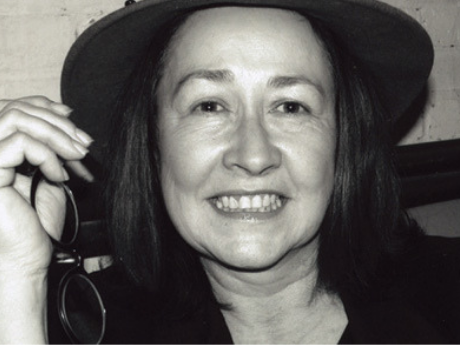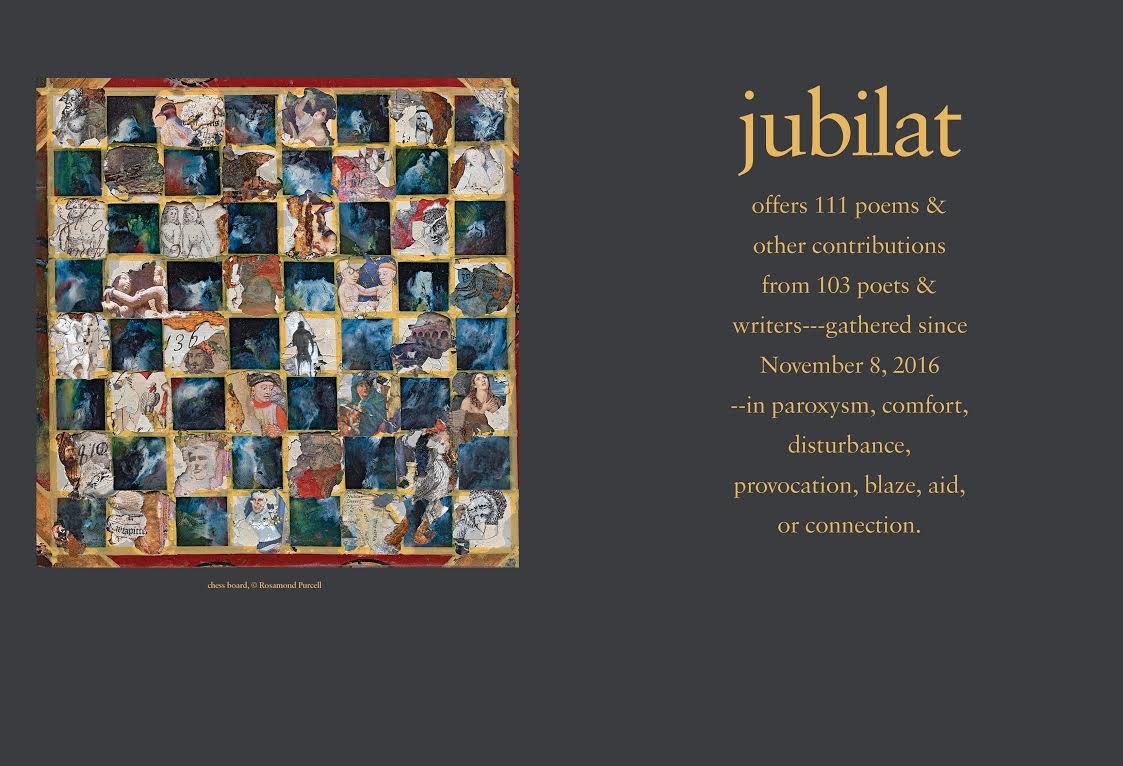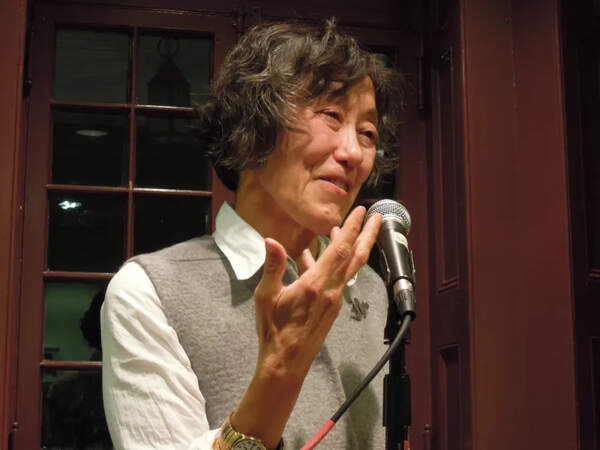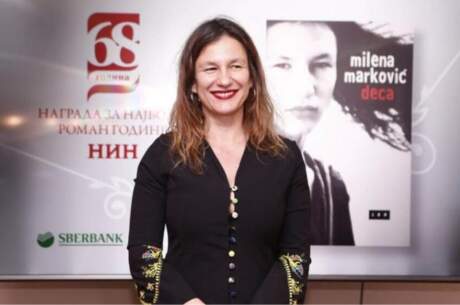Interviews
An Interview with Dara Wier

A few days after the presidential election I received an email from the literary magazine jubilat stating: "In light of recent historical and political events jubilat magazine will be putting together a galvanizing, consoling, activating, inspiriting, inciting, instigating, motivating, thought-provoking special (emergency) issue of poems. We'd like to offer our readers encouragement, connection, aid, provocation, humanity and spirit—whatever range of things it is that poetry and only poetry can do in this particular post-November 8th, 2016 time." The issue has just been published, and the contributors list is included on the right side of this article. I emailed with the poet Dara Wier, jubilat's executive editor, to ask a few questions about the special issue of the magazine and the role of the poet in uncertain political times.

Did you find yourself immediately turning to poetry after the election? And if so what poems? And why?
Like so many others I immediately found myself speechless, wordless, and silent; that was a sign signaling how deeply disturbed, confused, dumb-founded and in need—in need of something—I was; it became apparent right away as I met others that this feeling of being dumb-founded was not uncommon and widely shared.
Times like these are times when people often do turn to poetry. When without words otherwise, we hope to find something akin to how we feel in the ways words are in poems.
A poet friend, Jono Tosch, was at my house one of those first days after November 8th; we agreed it might be best not to try to put anything we were feeling into words—in other words, we'd probably rather not talk about it yet—it was that awful and that much of a shock to anyone's sense system, like a blow from which one needs some time to recover, like the near beginning of a panic attack, like the speechlessness one feels in the presence of death, or like the silence that follows.
On the fourth day it occurred to me that by opening jubilat's pages to poets, writers, artists, who might because of our invitation feel motivated to supply words or images, their own or ones they'd turned to, thus beginning together to attempt to put into words the start of what it would seem will be a long and difficult conversation—as a certain kind of lack of knowing carries with it. Caryl Pagel, Kevin Gonzalez, Emily Pettit, jubilat's editors, wanted jubilat to do this as well. And luckily the poet Jon Ruseski, who was recently an Assistant Editor for jubilat, offered to join in to get the issue put together. And thanks to Lori Shine for her especially urgent technical assistance.
After we all agreed, we sent out an invitation including inviting others to invite any one they wished to invite.
We agreed not to turn away anything we received.
We like to think we like to be near mystery and near what can't be put into words and that is true—though not all the time.
There are endless things that can't be put into words, and some things that shouldn't be put into words; political discourse is not one of those things. Politics is all about words. Even when the words in poems are not satisfying or not sufficient to our feelings and not directly addressed to what's literally at hand, on account of the intrinsic metaphysical nature of poetry its words and its nature still let us awaken and begin to get an inkling, we're allowed to wake up, we're allowed to think beyond a death or a blow or the terrible consequences of a miserable election. The one thing we can't conscience is inaction, and for a writer the action called for often directly involves words.
I've loved reading the words on the signs people took pictures of during the marches on January 20th 2016. I think jubilat will do a feature in our next issue and on our website including photographs of signs our subscribers and contributors send us. Even though many of these signs have shown up in many other places it seems okay to see them in as many places as we can.
What "responsibility" does an artist and/or cultural institutions have to artistically engage with politics?
This would depend on the institution's mission, constituency, conscience, collective consensus, previous involvement with politics, past promises to those it says it serves, future plans to continue its stated mission, or change directions, if required, to address new circumstances.
For an individual the choice is private, personal, and not to be determined by consensus, or necessarily in public. If an individual chooses to engage politics in public (seems natural enough) then what it means to be responsible is going to depend a lot on an individual's native, learned, adopted, imagined or espoused politics, political affiliations, political aspirations, political experiences, and finally, political character.
We're all used to people engaging politics with grandiose and flagrantly irresponsible use of words. That's one way it can be done. We all imagine seeing it done other ways.
And in our immediate future the usual assault against the arts, exemplified by the Heritage Foundation's ridiculous campaign to defund the National Endowment for the Arts [1] a campaign they've been waging since the 1980s) needs to be forcefully addressed by artists and lovers and beneficiaries of art (meaning us). It's obviously a symbolic attack led by the Heritage Foundation though their attack's result would not be symbolic; it would be literal and devastating, to artists and to art audiences.[2]
There's that saying, in dreams begin responsibility[3], and what is art if not a dream?
What surprised you about putting together the issue? A specific response, a certain poem, a theme developing?
It was surprising how quickly so many people responded. The response was immediate, as if people were waiting to become aware of an opening as our invitation was intended. You know how reluctant writers can be, and how procrastination is one of our best qualities sometimes—not in this case, the response was immediate, positive, and positively welcome.
It's stimulating to read a poem in the context this issue provides—the context rearranges and emphasizes the poem in ways specific to the stated mission of the issue: paroxysm, comfort, disturbance, provocation, blaze, aid, connection. Poems can be great chameleons or shape shifters, doing for us what we need whether we know what that is or not.
What kind of political effect can poems have on the world?
A poem can give someone courage, and confidence, and faith in what's needed to overcome the built-in limits of material existence including human-fashioned laws and stereotypes and falsifying and the use of fear to control us. A poem can serve to fuel the spirit we need to be able to be in charge of our own hearts and minds.
And a poem might assist someone in coming to terms with what it means to distinguish between deception and make-believe and between ostensible intentions vs. covert intentions—in politics the politician's intentions are supposed to be superficially up front and out in the open—but we know this is not always the case, it may seem to be seldom the case.
When I first encounter a poem, two things happen to me, I sense what the poet thinks about poetry, and I sense what the poet thinks about me. Likewise, when encountering politics—to sense what politics believes about politics (what is it for) and to sense what it believes about me—that is what I gather in order to make sense of where my allegiances, and trust, and sometimes money (I buy a book, I give to support a politic cause) and time will go. And from what do I get what I sense...from the words of the poem or of the politics and politicians. You know that old admonishment, it's not what I say, it's what I do...well, in some cases what is being said is what is being done. If I feel able to read a poem, that is, trust that the poem and I are understanding and respecting one another, I'd say I can trust that I'll also have a better chance of knowing how to take things in other locations, in other sites, for example, know how to take what is heard coming out of a politician's mouth.
"It is impossible to refute a statement made in a poem; poetry is by nature true and affords blanket protection to anything one wishes to say in it." —John Ashbery
The way certain politician's behave around words you'd think they think they are always in the process of writing poems.
I like what Mr. Ashbery's sentence makes me think about one difference between poetry and politics.
In politics everything said in it is not necessarily true; the study of how to tell what's true and untrue, what's of use regarding untruths or fictions and how can it be that something untrue is not a lie, and how we regard truthfulness and sincerity in poems is so complicated...in other words in a poem if there is something that is not reality-based (e.g. I founded the town (when I did not found the town) it isn't deception in order to manipulate someone or strategy designed to manipulate someone into giving up their power—in poems and in fiction we know we are in worlds made up as if...this is not politics, this is art, and the distinction is a distinction we need, the varieties of ways of being, of what things and people and ideas and ways of thinking are and might be are lent to us in poems and fictions, we learn to be who we're not in there, we gain time in there, we gain experiences one life could never have on its own. Poets of all people are aware of how powerfully effective words are.
What poems of the past do you think had the largest effect on the political climate, or that still effect us today?
If, say, we're expanding the defining edges of "politics" to include religions and philosophies and visions of power dynamics and the ins and outs of human character...(will, ambition, empathy, love, an ability to feel we are inside all existence), to begin with I think I'd say Dante's Inferno for just one instance, and oh, epics of all kinds, The Odyssey, The Battlefield Where the Moon Says I Love You, and in perfectly clear lyrics such as W.H. Auden's "Musée des Beaux Arts," or Marianne Moore's "When I Buy Pictures," and all the overtly political poems we know such as Mayakovsky's or Celan's or Max Jacob's, being just the fewest examples. I also think in the literary world less leaning on E. Pound would be extremely helpful.
What kind of work do you think poets can do outside of writing poems to help promote the politics they care about?
Work for all the good groups and commons and causes we know need our attention and assistance right now—honest legitimate entities in favor of the living rights of freedom to choose, what we believe, how we live, with whom we associate, where we go, what we say or write, how we support ourselves to the degree we're able, what skills we use, how we increase our ability to know what hurts us and what helps us, how we understand and support one another, what we determine to be the truth and value of our lives.
Contributors to jubliat, 30.5
Mira Bartok, Bryan Beck, Lisa Beskin, Luke Bloomfield, Emily Bludworth de Barrios, Ana Bozicevic, Hannah Brooks-Motl, Laynie Browne, Michael Burns (via Shannon Burns), Tina Cane, Dan Chelotti, Jack Christian, Ashley Colley, Arda Collins, Jessica Comola, Constance Congdon, CA Conrad, William Corbett, Michael Earl Craig, Heather Christle, Jim Daniels, Kyle Dargan, Dot Devota, Christopher De Weese, Diane Di Prima (via Peter Gizzi), Joseph Donahue, Timothy Donnelly, Karen Donovan, Kristen Elde, Corwin Ericson, Michael Estes, Tarfia Faizullah (via Rachel Abramowitz), Jessical Fjeld, Leora Fridman, Laura M. Furlan, Adam Grabowski, Kimiko Hahn, Cathryn Hankla, Steve Healy, Brian Henry, Nazim Hikmet (via Lori Shine), Brenda Hillman (via Brett Fletcher Lauer), Lauren Hunter, Julia Johnson, Kathranne Knight, Brian Laidlaw, Seth Landman, Nick Lantz, Emma Lazarus (via Lynn Melnick), Kelly Le Fave, Lesle Lewis, Kate Linroos, Paul Lisicky, Eric Lorberer, Julia Madsen, Osip Mandelstam (via Lesley Yalen), Adrian Matejka, Andrew McAlpine, Shane McCrae, Frances McCue, Michael Medeiros, Edie Meidav, Lynn Melnick, Herman Melville (via Seth Landman), Christopher Merrill, Philip Metres, Albert Mobilio, Anthony Moll, Lucy Moran, Blueberry Morningsnow & Aleta Lanier, Alicia Mountain, Laura Mullen, Alicia Rebecca Myers, Travis Nichols, George Oppen (via Michelle Taransky), Joe Pan, Seth Parker, Erin Perry, Kiki Petrosino, Boomer Pinches, Dean Rader, Jessica Rapisarda, Brynne Revele-Henry, Elizabeth Robinson, Matthew Rohrer, Dan Rosenberg, Jon Ruseski, Laurie Saurborn, Lauren Shapiro, Somaz Sharif (via David Feinstein), John Sieracki, Charles Simic (via Jono Tosch), Jordan Stempleman, Bianca Stone, James Tate (via Dara Wier), Lena Tsykynovska, John Emil Vincent, William Waltz, Rosanne Wasserman, Arisa White, Laura Willwerth, John Yau, Dean Young, Matthew Zapruder, Rosamond Purcell
NOTES:
[1] The NEA portion of the Federal Budget is estimated to be from 0.002 to 0.012, so minuscule to be ludicrous in proportion to the steady and frequent and determined and loud and vicious attacks on the arts mounted by those who wish to defund them.
[2] In the mid 80's the Heritage Foundation used some of my poems from my first book, Blood, Hook & Eye as examples of the NEA's support of pornography; my experience with how something can be twisted into nefariously false evidence.
[3]Delmore Schwartz story and book title is In Dreams Begin Responsibilities; he says he took that from W.B. Yeats' book epigraph "in dreams begin responsibility" which Yeats attributes to an old play.
* * *
The section below includes notes I found while looking to see how far the new regime plans to go with anti-art policy.
from The New York Times last week (Jan, 2017)
"The Trump Administration needs to reform and cut spending dramatically, and targeting waste like the National Endowment for the Arts and National Endowment for the Humanities would be a good first step in showing that the Trump Administration is serious about radically reforming the federal budget," said Brian Darling, a former aide to Paul and a former staffer at the Heritage Foundation.
* * *
Excerpts from 1997 Heritage Foundation (the foundation for all Trump era policy draws from what you see below, 20 years ago approx..) article "Ten Good Reasons to Eliminate the Funding for The National Endowment for the Arts:"
"A radical virus of multiculturalism, moreover, has permanently infected the agency, causing artistic efforts to be evaluated by race, ethnicity, and sexual orientation instead of artistic merit. "
"In 1993, Roger Kimball reported that an 'effort to impose quotas and politically correct thinking' was 'taking precedence over mundane considerations of quality.'"
"Perhaps the most prominent case of reverse discrimination was the cancellation of a grant to the Hudson Review, which based its selections on 'literary merit.'"
"More recently, Jan Breslauer wrote in The Washington Post that multiculturalism was now 'systemic' at the agency. Breslauer, theater critic for The Los Angeles Times, pointed out that 'private grantees are required to conform to the NEA's specifications' and the 'art world's version of affirmative action' has had 'a profoundly corrosive effect on the American arts-pigeonholing artists and pressuring them to produce work that satisfies a politically correct agenda rather than their best creative instincts.' NEA funding of 'race-based politics' has encouraged ethnic separatism and Balkanization at the expense of a shared American culture. Because of federal dollars, Breslauer discovered, 'Artists were routinely placed on bills, in seasons, or in exhibits because of who they were rather than what kind of art they'd made' and 'artistic directors began to push artists toward `purer' (read: stereotypical) expressions of the ethnicity they were paying them to represent.' The result, Breslauer concluded, is that 'most people in the arts establishment continue to defer, at least publicly, to the demands of political correctness.' "
"Aside from such blatant cultural engineering, the NEA also seems intent on pushing "art" that offers little more than a decidedly left-wing agenda…"


